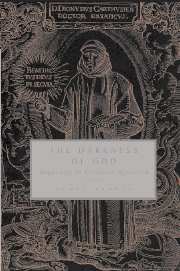Book contents
- Frontmatter
- Contents
- Acknowledgements
- Introduction
- PART ONE TWO SOURCES AND A SYNTHESIS
- PART TWO DEVELOPMENTS
- 6 Eckhart: God and the self
- 7 Eckhart: detachment and the critique of desire
- 8 The Cloud of Unknowing and the critique of interiority
- 9 Denys the Carthusian and the problem of experience
- 10 John of the Cross: the dark nights and depression
- 11 From mystical theology to mysticism
- Further reading
- Index
8 - The Cloud of Unknowing and the critique of interiority
Published online by Cambridge University Press: 23 November 2009
- Frontmatter
- Contents
- Acknowledgements
- Introduction
- PART ONE TWO SOURCES AND A SYNTHESIS
- PART TWO DEVELOPMENTS
- 6 Eckhart: God and the self
- 7 Eckhart: detachment and the critique of desire
- 8 The Cloud of Unknowing and the critique of interiority
- 9 Denys the Carthusian and the problem of experience
- 10 John of the Cross: the dark nights and depression
- 11 From mystical theology to mysticism
- Further reading
- Index
Summary
This writyng that next foloweth is the Inglische of a book that Seyntc Denys wrote unto Thimothe, the whiche is clepid [called] in Latyn tonge Mistica Theologia. Of the whiche book, forthi that it is mad minde [referred to] in the 70 chapter of a book wretin before (the whiche is clepid the Gloude of Vnknowing) how that Denis sentence [opinion] wol cleerli affcrme al that is wretyn in that same book; therefore, in translacioun of it, I have not onliche folowed the nakyd lettre of the text, bot for to declare the hardnes of it [clarify its difficulties], I have moche folowed the sentence [interpretation] of the Abbot of Seint Victore, a noble & worthi expositour of this same book.
In this, his prologue to a translation of Denys' Mystical Theology, the Cloud Author rather puzzlingly claims both to have made a close rendering, following ‘the nakyd lettre of the text’ (which is far from true) and to have done so in accordance with the ‘sentence’ of Thomas Gallus, the thirteenth-century Abbot of St Andrew at Vercelli (which, for sure, he has). The Cloud Author thus at once makes clear that his indebtedness to Denys has been acquired through personal acquaintance with his writings and concedes that his reading of them is filtered through at least the century of Victorine interpretation which fed into Gallus, if not through the influence of others since that time.
- Type
- Chapter
- Information
- The Darkness of GodNegativity in Christian Mysticism, pp. 186 - 210Publisher: Cambridge University PressPrint publication year: 1995



